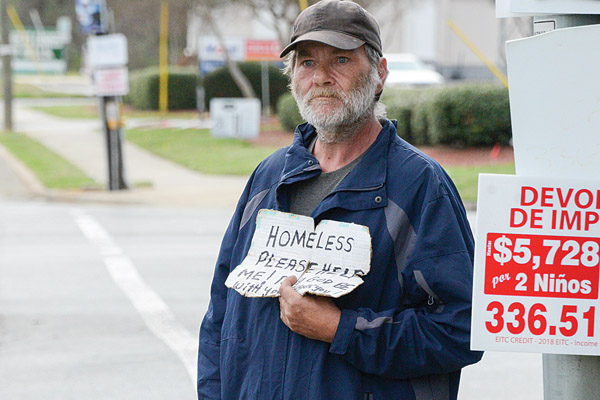Tuesday, July 24 at 5:30 p.m. in the Greensboro City Council Chambers is when the rubber meets the road for the city’s proposed panhandling ordinances. The City Council is holding a special meeting on this issue alone and drafts of the new ordinances have been released.
Back in April, the Greensboro City Council rescinded the ordinance on panhandling that required panhandlers to have a permit and restricted the times and places people could panhandle. The City Council planned to pass a new ordinance prohibiting aggressive solicitation but failed to approve it.
So since April the city has had no ordinances on panhandling, but the City Council has spent hour after hour listening to speakers on panhandling and then, in June, when the ordinance was slated to be passed, the City Council instead voted to continue the discussion with five public forums.
Now that the public forums have been held, outside attorneys hired and countless discussions held, the new ordinances are not quite in final form but close.
Mayor Nancy Vaughan said that after councilmembers read the proposed ordinances, there was a consensus that the ordinances written to apply only to the downtown needed to be amended to apply to the entire city.
Vaughan said that she had heard complaints about panhandling from every district of the city and her immediate response to reading the proposed ordinances was that they needed to be citywide.
One of the proposed ordinances will prohibit solicitation in city-owned parking decks and parking lots. The draft ordinance states, “The city council finds that municipal owned or operated parking garages and parking lots are not traditional public forums for First Amendment purposes, and that the city may regulate conduct and use of the enterprise through adequate and reasonable rules.”
The ordinance goes on to state that solicitation and canvassing are prohibited.
Vaughan said that she has heard more complaints about aggressive panhandling taking place in the city parking lot on South Elm across from the Green Bean than any other single site.
The proposed ordinance does allow panhandling on sidewalks that pass through a parking lot or parking deck.
Violations of all of the proposed ordinances will be class 3 misdemeanors punishable by $50 fines.
One proposed ordinance prohibits blocking or impeding street and sidewalk access. This includes weaving in and out between cars, whether they are stopped or moving except if the person is crossing the street. It also prohibits throwing anything into a car as well as standing, sitting or lying down on a median that is less than six feet wide.
Harassment in a public space is also prohibited. This is defined as acts that would cause a reasonable person to feel threatened, intimidated or in fear of their safety. It is further defined in the ordinance as following someone, surrounding an individual and directing their passage through a public space or standing within three feet of someone at an ATM or a parking meter.
The current loitering ordinance is to be rescinded.
Vaughan said city councilmembers were still looking over the ordinances and making suggestions, but that she didn’t anticipate major changes.
The panhandling ordinance that passed in May only passed by a 5-to-4 vote, and for an ordinance to go into effect the City Council has to pass it with at least six votes or pass it twice at two different meetings by a simple majority, which is why it was scheduled to be voted on again in June.
Vaughan said that she thought there was a possibility that the proposed ordinances with minor changes such as making it citywide would pass.
Vaughan said, “This is about aggressive behavior not about panhandling. We know people have a right to panhandle.”
The city hired Mac McCarley of Parker Poe in Charlotte to assist in writing the new ordinances. He attended all the public forums.
The city has also amassed an impressive amount of information about complaints about panhandling in Greensboro as well as panhandling laws now in effect in the state as well as around the country.
Greensboro City Attorney Tom Carruthers said that they believed they had developed ordinances that will withstand a legal challenge and he was meeting this week with attorneys from the American Civil Liberties Union to discuss the proposed ordinances.

